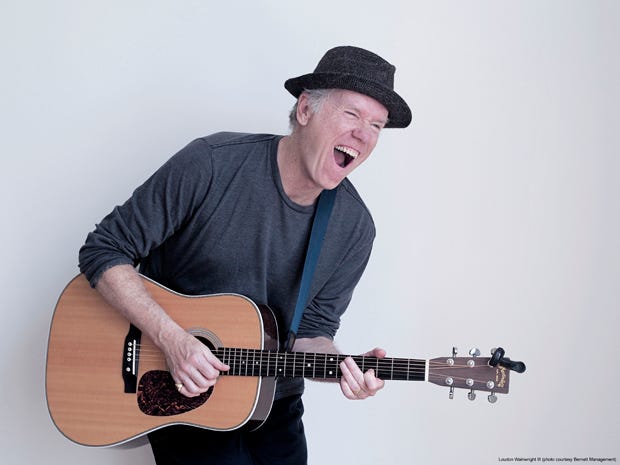#10 Stories from the Edge of Music: Charlie Watts
A Rolling Stone leads a jazz band, and a folkie tells you why he sings
This week’s Stories from the Edge of Music involves two very different musicians — and Richard Flohil presumes, after 10 weeks, that you’ve got the idea that this Substack covers a LOT of musical ground. Coming up in the near future: stories about Ani DiFranco, George Martin, Ray Charles and living on the road in Australia.
If you’ve not subscribed yet, please consider doing so. It’d be good to have you along for the ride.
++++++++++++++++++++++++++++++
Those were the days: A Rolling Stone needed a tax loss and the CBC had money
In the mid-’80s, presumably in need of a massive tax loss, and indulging in his passion for big-band jazz, Rolling Stones drummer Charlie Watts fronted a 16-piece group, including two other drummers, for one of the briefest trans-Atlantic tours ever.
This was no inexpensive pick-up band: this was an all-star collection of the top jazz musicians in Britain. The group would play three concerts, one each in New York, Toronto and Los Angeles.
Hired by promoter Rob Bennett to publicize the Toronto show, I made the obligatory call to the Rolling Stones’ New York City office. Crisply professional but equally friendly, the Stones' publicist told me that Watts would indeed do some interviews. “Just suggest to interviewers, though, that they concentrate on the fact that these are jazz dates,” they said. “Ask them not to bring up questions about the Stones. He’ll usually mention Mick and the band at some point, and that’ll open the door…”
Watts handled three or four phoners with print and radio, and agreed, I thought a bit reluctantly, to a last-minute interview with the CBC’s national newscast on stage at Massey Hall on the afternoon of the show, following the sound check.
The CBC crew arrived: a cameraman, a sound guy, a producer, a makeup person, and a young woman with a clipboard. The interviewer was Tim Blank, a nervous young man who later became a leading figure on the Fashion TV channel.
A few minutes before the interview, he came to me with a worried look on his face. “Well,” he said, “I don’t know what to ask him… what do you suggest?”
I pointed out that Watts was leading a jazz band on a stage that had seen concerts by Louis Armstrong, Duke Ellington, Ella Fitzgerald, Charlie Parker and literally dozens of other legendary jazz figures. That would be a good start, I suggested.
“Just don’t go asking about the Rolling Stones first off,” I added.
A member of his crew went to fetch Watts, who sidled onto the empty stage looking particularly uncomfortable. Pale, white-haired and balding, he silently endured the ministrations of the make-up woman, did a quick mic check, and then indicated he was ready.
“So,” lisped the interviewer, “What’s a famous Rolling Stone doing leading a jazz band?”
There was an uncomfortable silence for a few seconds. Then Watts raised his eyes, looking at the interviewer for the first time.
“You just asked the wrong fucking question, mate,” he muttered.
The interview went downhill from there. And we got 30 seconds on the news that evening.
++++++++++++++++++++++++++++++++++++
A PERFORMER EXPLAINS WHY HE DOES WHAT HE DOES
Loudon Wainwright, now in his late 70s, has made more than 30 albums, written hundreds of songs, been in dozens of films and television shows, written his autobiography — and has played thousands of live gigs.
His songs are witty, sarcastic, mordant and sometimes deeply moving, and he is a brilliant one-man performer who usually has his audience in the palm of his hand. Rolling Stone once called him the poet laureate of family dysfunction — and his incredibly talented kids, Rufus and Martha, would probably agree.
At a Winnipeg Folk Festival in the late ’90s, however, he has earned the ire of a determined group of a dozen angry women. They are deeply offended by one of his off-the-wall songs — “Surfin’ Queen” — about a California dude who has turned his dead girlfriend into a surf board.
Armed with placards, they heckle and boo at every workshop he’s taking part in, even though Ferron — the feisty lesbian feminist who’s sharing the stage with him — treats him with the friendly patience one shows to a recalcitrant schoolboy. “Oh, Loudon, come on…”
His angry tormentors, however, are particularly vociferous at his mainstage performance. Finally, he gets them to quiet down, and he talks, in a quiet, direct tone about what being a performer really means.
“You know,” he explains, as the 12,000 people in the audience pay close attention, “you might ask yourself why people like us — the performers at this festival — do what we do.
“It’s not easy. We live on the road, we don’t sleep very well, and sometimes we don’t sleep at all. We can’t remember where our homes are. We usually can’t even remember what town we’re in.” He pauses, then adds, “We have messed up our relationships with our wives, and our kids are screwed up and we hardly see them. We live in airports or tour buses or crappy motels. Above all, we are so very lonely.”
The audience is completely silent. “So why do we do this? Why do we live like this?”
Then he answers his own question, rearing back on his heels and shouting as loud as he can: “WHY?
“BECAUSE WE WANT TO GET LAID!”
+++++++++++++++++++++++++++++++++++++++
QUOTE OF THE WEEK
A cautionary comment about how stories change in the telling:
“… a healthy brain quickly forgets most of what passes into conscious awareness. The fragments of experience that do get encoded into long-term memory are then subject to ‘creative editing.’ To remember an event is to reimagine it; in the reimagining, we inadvertently introduce new information, often colored by our current emotional state. A dream, a suggestion, and even the mere passage of time can warp a memory.” — David Kortava reviews Remember, by Lisa Genova, in The New Yorker, March 2021.
+++++++++++++++++++++++++++++++++++++++
THIS WEEK’S VIDEO LINK
Loudon Wainwright only had one Billboard hit — a 1972 novelty song called “Dead Skunk in the Middle of the Road” that went to #16, but #1 in Little Rock, Arkansas. Laugh if you like, but not many artists get even one hit… Here he is, closing off a folk festival.
+++++++++++++++++++++++++++++++++++++++
FINALLY, A PERSONAL NOTE ABOUT THIS SUBSTACK
In less than three months, Stories from the Edge of Music has some 360 subscribers, 21 of whom have joined since November 1, which I’m told is remarkable for a new Substack. So, first of all, thank each of you for being part of this.
Secondly, I want to thank
, whose own Substack, , I recommend to anyone who cares about music. His Substack continually leads me to music by artists I’ve not heard (and in many cases not heard of). He also adds a calendar of concerts and club dates that’s invaluable if you live in the broader Toronto region, and a source of envy to his readers everywhere else.Most important, I want to thank him of dealing with the all the technical aspects of getting Stories from the Edge of Music from my scattered brain (and crappy typing) to you. I could not be able to tell these stories without his weekly help, his copy-editing eye and his considerable computer skills.
+++++++++++++++++++++++++++++++++++++++
Stories from the Edge of Music is a reader-supported publication. If you’re enjoying these posts, please consider supporting my work and becoming a paid subscriber. Soon, there will be additional stuff just for paid subscribers.






Damn good to read these great stories! Thanks for just being the very best you, Ricahrd!
You are a great storyteller, Richard. Reel ‘em in and then... whammo... hit ‘em with the punchline! Keep ‘em coming!!!